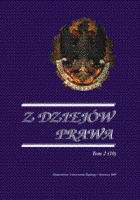Wpływ kościelnego doświadczenia w rozstrzyganiu sporów na formę procesu cywilnego w Europie
The influence of the church experience in adjudicating conflicts on the forms of the civil trial in Europe
Author(s): Remigiusz SobańskiSubject(s): Law, Constitution, Jurisprudence
Published by: Wydawnictwo Uniwersytetu Śląskiego
Summary/Abstract: As early as in the Ancient church the bishop.s task was to adjudicate conflicts between the congregation. The sense of responsibility for the congregation and the lifestyle of a Christian district make the bishops exercise the judiciary of peace. It must have functioned pretty well as Constantine accepted the efficiency of adjudications on the civil forum given by bishops (.episcopalis audientia.) in 318. A special attention was paid to the procedures, but the rational methods of proof were worked out only after the Fourth Lateran Council (1215). The procedures were to lead to establish the truth whereas the way to it was seen in a dispute. A court trial was based on a university dispute: present the issue, formulate the thesis, prove it and draw a conclusion. A court trial is a hypothesis discussed in the court. The subject of discussion, deriving from the plaintiff.s complaint and a reply of the defendant.s side, was precisely defined, the proceeding took place according to the precisely defined steps, the judge was in charge of the behaviour of the argumentation rules. This Roman-Canonical process was governed by the rule of the formal truth. The canons could not discern the problem of the unfair sentence. The discussion over it made it possible to accept in some cases the means against an unfair sentence and differentiate between the earthly and the spiritual. The church competency was restricted to the spiritual issues exclusively starting from the 14th century.
Journal: Z Dziejów Prawa
- Issue Year: 10/2009
- Issue No: 2
- Page Range: 13-23
- Page Count: 11
- Language: Polish

